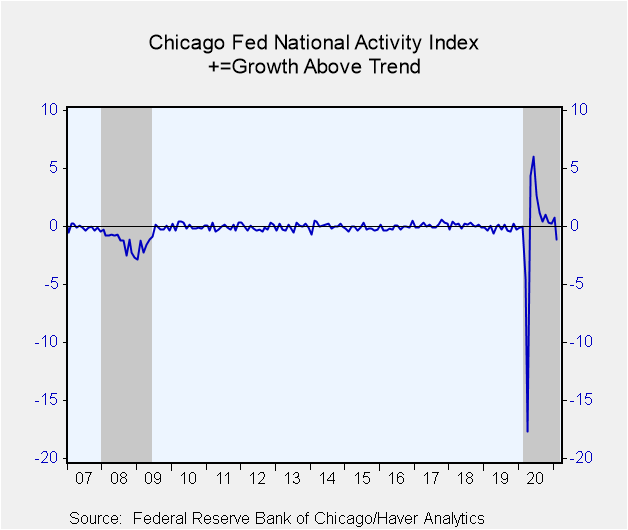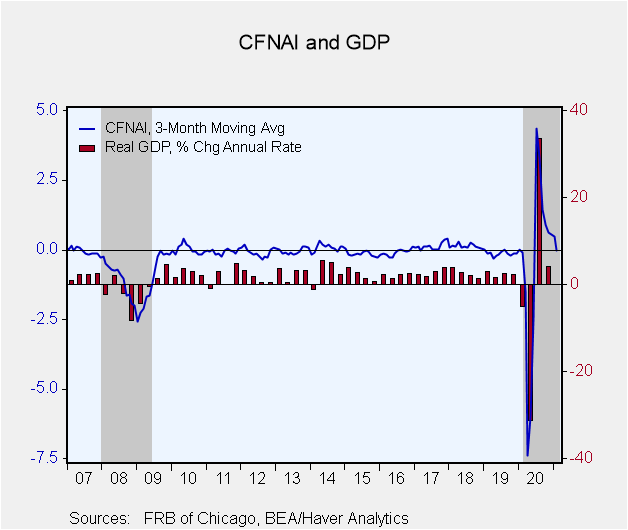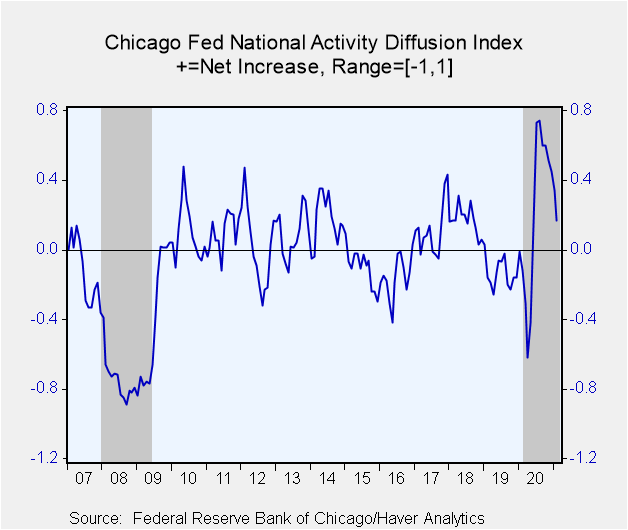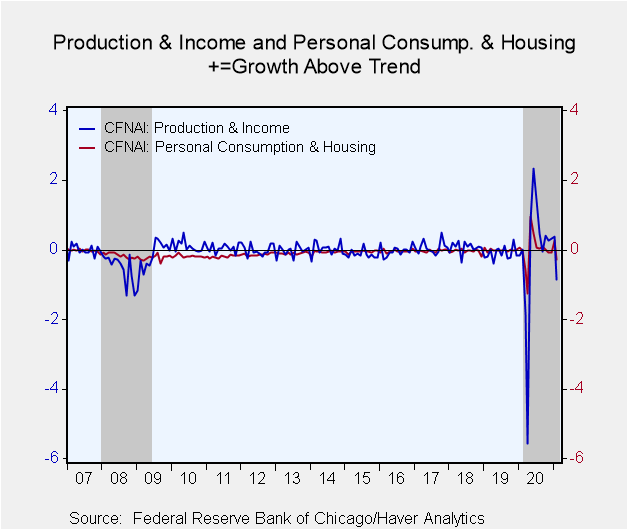 Global| Mar 22 2021
Global| Mar 22 2021Chicago Fed National Activity Index Declines in February
by:Tom Moeller
|in:Economy in Brief
Summary
• Severe winter weather likely curtailed activity. • Production & income and personal spending & housing fall. The Federal Reserve Bank of Chicago's National Activity Index fell to -1.09 during February from 0.75 in January, revised [...]
• Severe winter weather likely curtailed activity.
• Production & income and personal spending & housing fall.
The Federal Reserve Bank of Chicago's National Activity Index fell to -1.09 during February from 0.75 in January, revised from 0.66. The index had been positive since May of last year.
The three-month moving average, which smoothes out the m/m volatility in the index, fell last month to -0.02 from 0.46 in January. It was the weakest reading since June of last year. During the last 20 years, there has been a 92% correlation between the Chicago Fed Index and quarterly growth in real GDP.
A decline in the Production & Income component led the weakness in the total, falling to -0.85 from 0.37 in January. The Personal Consumption & Housing series declined to -0.29 from 0.27 in January. It was the fourth negative reading in five months. The Sales, Orders & Inventories series slipped to 0.03 from 0.05, remaining well below the high of 0.20 averaged in the third quarter of last year. The Employment, Unemployment & Income series eased to 0.02, its lowest level since April of last year. The CFNAI diffusion index, which measures the breadth of movement in the components, declined to 0.17 as 51 of the 85 component series contributed negatively and 34 made positive contributions to the index overall.
The CFNAI is a weighted average of 85 monthly indicators of national economic activity. It is constructed to have an average value of zero and a standard deviation of one. Since economic activity tends toward trend growth rate over time, a positive index reading corresponds to growth above trend and a negative index reading corresponds to growth below trend.
These figures are available in Haver's SURVEYS database.
| Federal Reserve Bank of Chicago | Feb | Jan | Dec | Feb'20 | 2020 | 2019 | 2018 |
|---|---|---|---|---|---|---|---|
| Chicago Fed National Activity Index (+ = Growth Above Trend) | -1.09 | 0.75 | 0.28 | 0.02 | -0.49 | -0.14 | 0.11 |
| Production & Income | -0.85 | 0.37 | 0.33 | 0.00 | -0.14 | -0.10 | 0.06 |
| Employment, Unemployment & Hours | 0.02 | 0.04 | 0.02 | 0.05 | -0.31 | 0.00 | 0.08 |
| Personal Consumption & Housing | -0.29 | 0.27 | -0.08 | -0.03 | -0.04 | -0.02 | -0.04 |
| Sales, Orders & Inventories | 0.03 | 0.06 | 0.02 | 0.01 | -0.01 | -0.03 | 0.01 |
| CFNAI 3-Month Moving Average | -0.02 | 0.46 | 0.55 | -0.10 | -- | -- | -- |
| CFNAI Diffusion Index | 0.17 | 0.34 | 0.45 | -0.12 | 0.19 | -0.13 | 0.17 |
Tom Moeller
AuthorMore in Author Profile »Prior to joining Haver Analytics in 2000, Mr. Moeller worked as the Economist at Chancellor Capital Management from 1985 to 1999. There, he developed comprehensive economic forecasts and interpreted economic data for equity and fixed income portfolio managers. Also at Chancellor, Mr. Moeller worked as an equity analyst and was responsible for researching and rating companies in the economically sensitive automobile and housing industries for investment in Chancellor’s equity portfolio. Prior to joining Chancellor, Mr. Moeller was an Economist at Citibank from 1979 to 1984. He also analyzed pricing behavior in the metals industry for the Council on Wage and Price Stability in Washington, D.C. In 1999, Mr. Moeller received the award for most accurate forecast from the Forecasters' Club of New York. From 1990 to 1992 he was President of the New York Association for Business Economists. Mr. Moeller earned an M.B.A. in Finance from Fordham University, where he graduated in 1987. He holds a Bachelor of Arts in Economics from George Washington University.
More Economy in Brief
 Global| Feb 05 2026
Global| Feb 05 2026Charts of the Week: Balanced Policy, Resilient Data and AI Narratives
by:Andrew Cates










